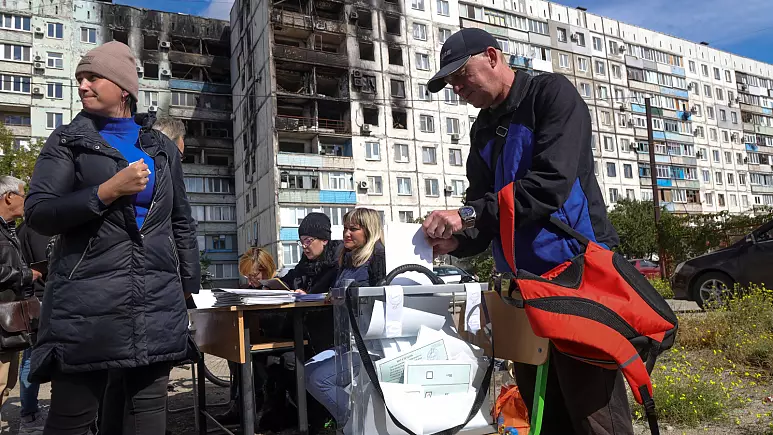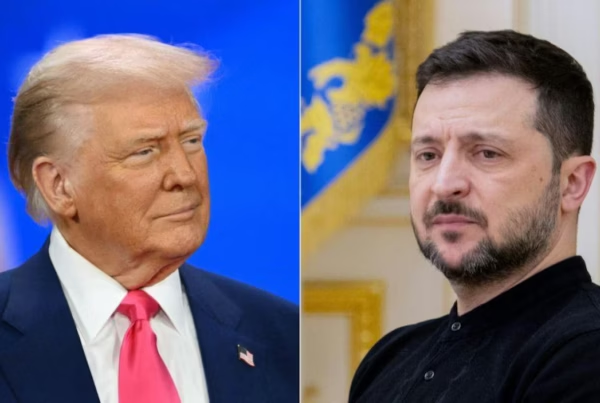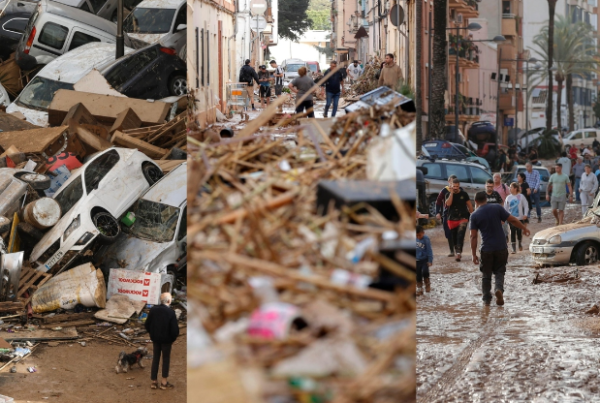By Mayya Chaykina
On 30 September, Russian President Vladimir Putin claimed that the people in the southern and western parts of Ukraine had “made their choice” and voted affirmatively in the referendums aiming to annex Donetsk, Luhansk, Zaporizhzhia, and Kherson. In all four regions, authorities claim the votes came close to 100%.
The head of the separatist and self-proclaimed Donetsk People’s Republic, Denis Pushilin, stated that a shocking 99.2% of participants voted to join Russia. The results are underpinned by threats and intimidation of citizens throughout the duration of the ‘referendums’. There are numerous reports of armed military officials going door-to-door to collect votes at gunpoint and giving no choice for residents to vote to stay in Ukraine. Instead, residents were simply asked whether they were in favour of seceding from Ukraine or joining the Russian Federation as one of its subjects, defined in the Russian constitution as being any territories, regions, cities of federal importance, Republics, and autonomous areas that make up the Russian Federation.
The president of Ukraine, Volodymyr Zelenskyy, has condemned the pseudo-referendums as a step that will place Putin “against everyone in the world”. Ukraine’s rapid gains and reclamation of villages have resulted in areas of the illegally annexed regions coming once again under Ukrainian control, with the army continuing to advance in the country’s southern regions.
In a significant gain for Ukrainian troops, the strategically important town of Lyman has also been reclaimed, with Russian troops completely withdrawing from the area. Lyman’s importance lies in its position relative to supply routes. Russian supply lines that were previously used to provide troops and soldiers to the south and the west of Ukraine are now cut off. The territory could be vital in supporting the next steps of Ukrainian troops as it provides crucial ground needed to further advance into the Luhansk and Donetsk regions, paving the way for further liberation of Ukrainian territory. Lyman’s reclamation has stimulated the morale of Ukrainian troops and given a significant victory to Ukraine as its loss as a logistics hub by the Russian army dealt a devastating blow to Russian troops.
The onset of winter, however, may bring difficulties for both troops and civilians. Deputy Head of the Belorussian KGB Ivan Tertel, who has supported Russia during the war, believes that winter will bring a “turning point”.
A harsh climate coupled with an increase in demand for basic provisions will likely strain supply lines, slowing the movement of troops across the muddier and snowier ground. Civilians will bear the brunt of attacks on infrastructure, which Sam Charap, an expert on Russia with the Rand Corp., says will become increasingly common. Russian strategy, he says, will come to rely on “causing pain on civilians who are far away from the front line”.
This turn towards a battle of stamina means that troop movements will likely become more difficult in winter weather, with underequipped Russian troops already experiencing frostbite. Ukraine, however, will receive greater local support, as well as supplies from allies who will be able to provide the necessary insulating clothing to survive the weather. Ukraine’s recent advances will also grant a key advantage in moving forward with the reclamation of territory, potentially cutting off further Russian supply lines and contributing to the morale of Ukrainian troops.
The reclamation of key territory in regions where sham referendums were held has sparked heated comments by Moscow and its allies. Ramzan Kadyrov, a Chechen leader who has supported the Kremlin throughout the war, has suggested that nuclear weapons should be used in the case of further Ukrainian territorial gains. His rhetoric is in line with other Russian allies and leaders: former President Dmitri Medvedev has echoed his sentiments through more implicit suggestions stating that Russia had a right to “defend itself with nuclear weapons” and that his statements were “certainly not a bluff”.
The Western world is no stranger to Putin’s nuclear threats, with his most recent speech on the referendums reiterating old Soviet talking points and threatening his enemies with Russia’s nuclear arsenal. Putin blamed the United States for “creating a precedent” for nuclear attack, implying the possibility of Russia using nuclear weapons at any sign of a threat.
The Russian president’s most recent remarks have drawn speculation about the desperate state of affairs in his own country and whether officials have begun to panic. Internal unrest over the declaration of a partial mobilization in Russia and major Ukrainian victories taking back land have created an urgent atmosphere for the Russian government.
Anti-mobilization protests and a steady flow of citizens leaving the country signal the cost of Putin’s gamble. Desperate to advance, Russian officials may not even know the territory they claim to have annexed. In a press conference with Kremlin spokesman Dmitri Peskov, it was impossible to glean a straightforward answer as to what the new ‘borders’ of the Russian Federation would be. Instead, Peskov promised to consult with the population of Kherson and Zaporizhzhia on their opinions on borders.
Putin, who has remained silent on these border issues, has already ratified official annexation orders. No state has recognized the annexations as legitimate except North Korea, which has also vocally supported the referendums.
On the other hand, Western countries, against whom Putin railed in his furious speech on 30 September at a ceremony to officially annex the Ukrainian regions, have already prepared new sanctions in response to the illegal annexation. Among these sanctions, a new ban on imports and exports, as well as a price cap on Russian oil (specifically on its maritime trade) are set to be implemented. Exporting between 7 and 8 million barrels of oil daily, Russia is the largest exporter of oil internationally. Whether the EU’s attempt to reduce Russia’s power in the world economy will be effective is an entirely different question that will be answered in the coming weeks.
Despite this uncertainty, past measures have shown to be less effective than desired; economist David Fyfe puts the current increase in revenue due to crude oil at 41% despite numerous sanctions. A price cap targeting oil has the potential to reduce these revenues and, by extension, funding for the war.
The economic measures may not be sufficient to deter Russia from attempting to advance its plans in its bloody war in Ukraine. Russia’s claims that the illegally annexed territories would be with Russia “forever” have opened up the opportunity for the Kremlin to claim attacks on Russian soil and increase aggression as a form of retaliation if the West supplies weapons to Ukraine that are used on this territory. In response, President Zelenskyy has accelerated Ukraine’s request for NATO membership.
Though the war complicates the approval of his request, nine members have already voiced their support for Ukraine’s potential membership. Article 5 of the 1949 NATO treaty states that an armed attack on any member state will result in action taken by other members of NATO to protect the security of the North Atlantic area. The potential for increased conflict with Russia has resulted in reluctance in allowing Ukraine to join, with the possibility of other countries becoming implicated in the war. Russian officials, meanwhile, have stated that the request is tantamount to asking NATO to “accelerate the start of World War III”. NATO has yet to provide a timeline for Ukraine’s request.
How this next stage of the war in Ukraine develops remains to be seen. Just over seven months into the war, Ukraine has regained key areas and Russia has been thrown into internal turmoil while Western countries attempt to curb its power through economic sanctions. All eyes are on Ukraine as it advances its position and continues to liberate its territories.
Other posts that may interest you:
Discover more from The Sundial Press
Subscribe to get the latest posts sent to your email.





